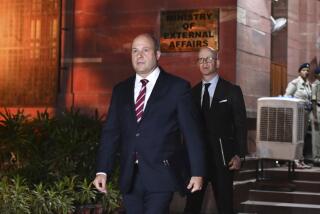Britain Expels 75 Iraqis, Cites Hussein Threats
- Share via
Britain ordered the expulsion of eight Iraqi Embassy staff members and the deportation of 67 other Iraqis on Thursday, citing Iraqi threats to attack Western targets if war breaks out.
“These threats have been made and this is the response,” a Foreign Office spokeswoman said.
There were these other developments Thursday on the periphery of major U.S. and European diplomatic initiatives in search of a peaceful way out of the Persian Gulf crisis:
* The heads of state of Egypt, Syria, Sudan and Libya ended three hours of summit talks in Libya with no sign of progress toward finding a peaceful solution to the crisis.
* Officials from Iran, Turkey and Pakistan, meeting in the Pakistani capital of Islamabad, pressed for an urgent meeting of the Organization of the Islamic Conference--a group of mostly Muslim states--to organize a search for a negotiated a settlement of the crisis.
* Reports published in France said that Iraq had agreed in principle during secret talks in Geneva and Vienna to pull out of Kuwait, provided it is allowed to lease from Kuwait two offshore islands in the Persian Gulf. Soon afterward, however, Iraqi authorities in Baghdad flatly denied these reports.
In London, the ousted Iraqi Embassy staff members--seven diplomats and a security guard--were given 24 hours to leave Britain. Their families have a week to depart.
Home Secretary Kenneth Baker ordered the deportation of 67 Iraqis, mainly students, saying their presence was against “the public good for reasons of national security.” The students, among about 6,000 Iraqis studying in Britain, have until Jan. 10 to leave.
“The Iraqis have made a number of public threats. It is clearly prudent to take all precautions,” the Foreign Office spokeswoman said. “The Iraqi threats have been once again linked to the possibility of hostilities” in the Persian Gulf.
British officials declined to specify targets they suspect might be attacked but cited general threats by Iraqi President Saddam Hussein.
Embassy First Secretary Salih Faraj Mohammed, one of the expelled diplomats, said that two of the diplomats ordered out had left three months ago.
The expulsions, which the Foreign Office said will leave the Iraqi Embassy here with 15 diplomats and 17 non-diplomatic staff, raised the prospect of retaliation against the six British diplomats still posted at the British Embassy in Baghdad.
Presidents Hosni Mubarak of Egypt and Hafez Assad of Syria, Sudanese military ruler Omar Hassan Ahmed Bashir and Libya’s Col. Moammar Kadafi made no statement after their meeting in the Libyan seaside town of Misrata.
Egypt’s Middle East News Agency, which reported on the meeting, did not say whether the four leaders planned further talks.
The four represent both sides of the Arab divide over Iraq’s five-month-old occupation of Kuwait, and Libya had said that the the aim of the summit is “to find a peaceful Arab solution to the crisis.”
Egypt and Syria have sent thousands of troops to join the multinational force massed against Iraq on the Saudi border. Sudan and Libya have condemned Iraq but also said that they reject the military buildup in the gulf. They have portrayed Iraq as a country under threat from the United States, which dominates the anti-Iraqi alliance.
In Islamabad, Pakistani Prime Minister Nawaz Sharif opened talks with the foreign ministers of Iran and Turkey with a speech condemning Iraq for invading Kuwait.
A Flurry of Diplomacy on the Gulf Confrontation, Los Angeles Times
London: Britain expels eight members of the Iraqi Embassy staff and deports 67 other Iraqis whose presence is not conducive to ‘public good.’ Luxembourg: The foreign ministers of the 12 European Community nations meet today to weigh their own gulf peace initiative before the U.N.’s Jan. 15 deadline authorizing the use of force. Misrata: Egyptian President Hosni Mubarak, Syrian President Hafez Assad and Lt. Gen. Omar Hassan Ahmed Bashir, leader of Sudan’s ruling junta, meet in Misrata for talks with Libyan leader Moammar Kadafi on a possible Arab solution to the gulf standoff. Baghdad: An adviser to French President Francois Mitterrand, lawmaker Michel Vauzelle, arrives, and Iraqi officials say he will meet with Foreign Minister Aziz.
Iraq urges the European Community to put pressure on Washington to achieve an overall Middle East settlement and says an EC mission would be welcome in Baghdad only if it comes to negotiate. Islamabad: Officials from Iran, Turkey and Pakistan seek an urgent gathering of the Organization of the Islamic Conference to urge Muslim nations to negotiate a settlement in the gulf. United Nations: Secretary General Perez de Cuellar suggests U.N. Security Council may want to meet again to consider what to do if Iraq doesn’t pull out of Kuwait. He warns of a psychosis of war. Washington: Secretary of State Baker prepares to travel to Europe and the Persian Gulf next week to consult with U.S. allies. President Bush says Baker will be available to see Foreign Minister Tarik Aziz if the Iraqis should agree to meet with the secretary of state in Geneva.
Congress cancels its traditional three-week January recess. Democratic leaders announce that Congress will hold a full-scale debate on Bush’s Middle East policies after Baker returns.
More to Read
Sign up for Essential California
The most important California stories and recommendations in your inbox every morning.
You may occasionally receive promotional content from the Los Angeles Times.













